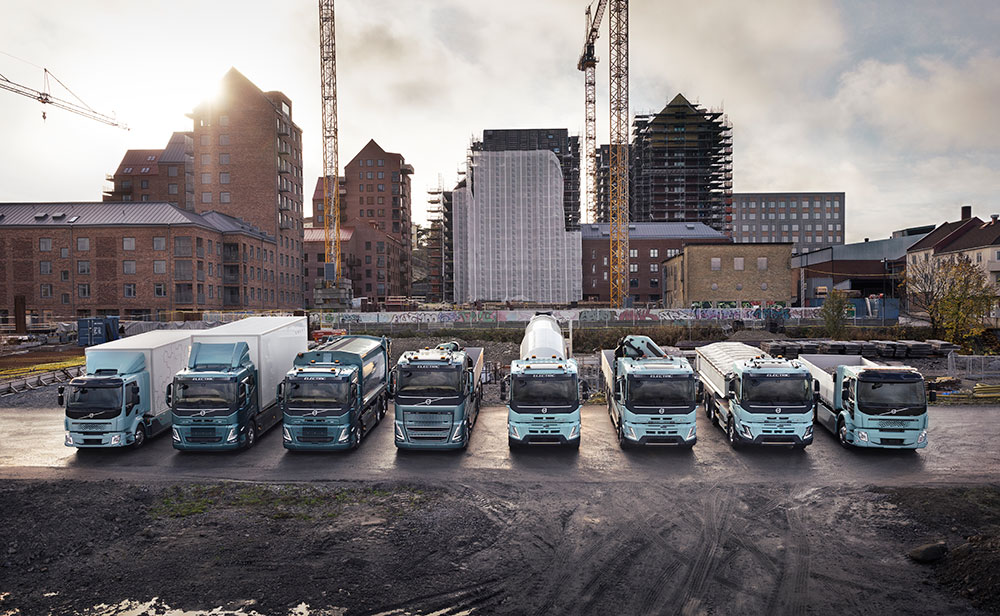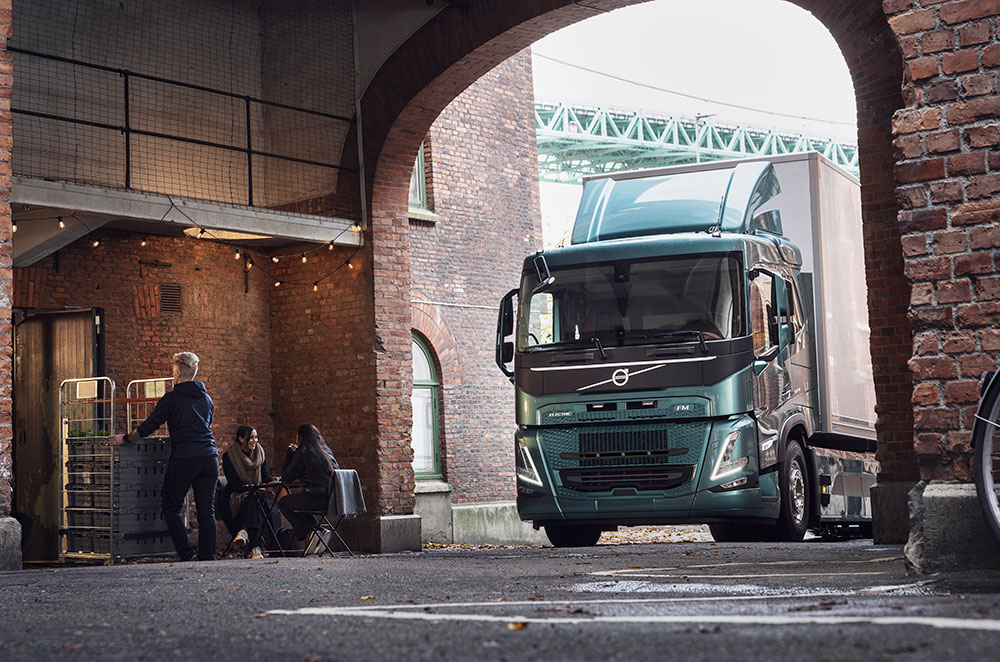Volvo’s big rigs go electric
Volvo launches Australia’s first battery electric heavy-duty truck models and announces plans to build trucks in Brisbane by 2027.

Queensland is set to play a leading role in the electrification of the Australian truck industry with Swedish truck maker Volvo announcing electric trucks will be made at its Wacol manufacturing facility in south east Brisbane from 2027.
President of Volvo Group Australia Martin Merrick said the company would push ahead with its plan to build electric trucks in Australia, despite being disappointed that the Federal Government’s National Electric Vehicle Strategy had little to say about heavy vehicles and road transport.
He called for government policies to accelerate battery electric vehicle (BEV) adoption and described the transport sector as “low-hanging fruit” that could be leveraged relatively quickly and easily to achieve Australia’s emissions reduction goals.
Volvo Truck Australia has unveiled two new heavy-duty battery electric trucks it plans to begin selling here, once regulatory hurdles are overcome.
Volvo already sells several smaller electric truck models here, but the new FH Electric and FM Electric models are the company’s first heavy-duty battery electric trucks, with load ratings of 44 tonne and 27 tonne respectively.
The new models have, however, run afoul of Australian Design Rules relating to front axe weight and vehicle width, despite already being on sale in other markets.
The Queensland Government has issued permits for the two new models to undergo local trials, but legislative change is required before they can legally be sold here.
“The barrier we have right now is legislation. If we don’t get legislation changes, we won’t meet those (emissions) targets,” Mr Merrick said, adding there was already strong customer demand for the new models from the likes of Australia Post, Linfox and Geodis.
“I strongly urge governments at all levels to work together to create a task force and deal with this legislation issue now.
“Then we can really take to reducing emissions here in Australia. We have the technology, we have the factory, we have the dealer network, we have the customers, and we are ready.”

Describing Volvo Truck as a “first mover” in the transport industry’s move to electrification, global President of Volvo Trucks Roger Alm said the company had decided battery electric is the best way for the company to reach its target of net zero emissions by 2040.
He said Volvo had started series production of its first electric trucks in 2019 and now had six different electric models in series production, which was the widest offering in the industry.
With around 7% of global CO2 emissions coming from heavy road transport, and with the demand for goods increasing as global population grows, Mr Alm said the transport industry needed to rapidly shift to fossil-free transport to stop global warming.
“With these new, electric trucks we are making it easier than ever for even more customers to go electric and for cities to shift to zero-emission vehicles for virtually all transport flows,” he said.
“Our customers can have these trucks custom-built for their specific operation, to cut emissions while getting the same functionality as the diesel truck they are using today.”
Volvo Truck has set a target of having 50% of its global volume as either battery electric or hydrogen fuel cell electric trucks by 2030 and for all its trucks to be net zero emissions by 2040.
While battery electric will play the biggest part in Volvo Truck’s emission reduction strategy, the company said it was not a silver-bullet solution and that it would continue to offer other technologies, including hydrogen fuel cell electric, and combustion engines that burned renewable fuels.
Last September, the Swedish truck maker started production of its heavy-duty electric truck range, making Volvo the only global manufacturer in series production of such electric trucks, although other manufacturers including Mercedes-Benz and Tesla are poised to launch similar rivals.
The two new models look like combustion engine variants in the Volvo Truck range but feature large battery packs arranged down the sides of the vehicle where fuel tanks would normally be, and electric motors located between the chassis rails.
The larger 44-tonne rated FH Electric is available with three different cab options, five to six battery packs depending on range requirements, useable energy storage of between 450–540kWh, up to 300km of range, and 490kW of continuous power from its three electric motors.

The smaller medium duty 16-26-tonne FL and FE Electric which was launched in Australia last year, is available with four different cab styles and three or four battery packs, providing a useable energy storage of between 265–375kWh, up to 225kW of continuous power available from its two electric motors, and range up to 300km.
While the claimed 300km range of these new heavy-duty models will prevent them from performing long-distance or remote-area road transport, Mr Merrick said the Australian market was nonetheless well suited to electrification, with around 35% of road freight occurring in urban areas.
Volvo’s electric trucks are currently built in the company’s Tuve factory in Gothenburg, Sweden, and at its Ghent plant in Belgium, but the new FH and FM Electric, as well as other models in the range will also be manufactured at Wacol alongside diesel-powered Volvo and Mack model from 2027.
Volvo Executives diligently avoided being drawn on price for the new heavy-duty trucks, saying that the size of any fleet order and the specific configuration of a truck significantly impacts pricing, but one experienced insider said the predicted cost would be multiples of the circa $400,000 price of diesel versions.
Senior Vice-President of Volvo Truck Australia Gary Bone confirmed the quantum increase for electric trucks was significantly greater than it is for passenger vehicles, but said that while the purchase price was higher, the operational cost per kilometre compared with a diesel was a more positive story.
“There is an increase over current internal combustion models, but we are working with customers who have placed orders so far, and they’re going in with eyes wide open,” Mr Bone said.
Linfox and Australia Post are among several major Australian brands already trialling the smaller FE and FL electric trucks, while Australian express freight giant Team Global Express last year placed an order for 36 Volvo FL Electric trucks.
Despite supply chain constraints Mr Bone said Volvo Truck Australia produced and sold more trucks out of its Wacol plant last year than at any time in its 50-plus years of manufacturing in Australia, and is currently sitting on its biggest order bank in history.
The company celebrated 50 years of manufacturing at Wacol last year and recently handed over its 75,000th locally manufactured truck.
Wacol is also unique in being the only plant in the world where Volvo and Volvo-owned Mack trucks are built side by side, with an estimated 800 people producing around 3,500 trucks for the two brands per year.
The Australian-made and certified trucks include a significant amount of local content sourced from around 90 local suppliers, with an estimated $600 million spent in the local economy, Mr Bone said.
Related topics
Things to note
The information in this article has been prepared for general information purposes only and is not intended as legal advice or specific advice to any particular person. Any advice contained in the document is general advice, not intended as legal advice or professional advice and does not take into account any person’s particular circumstances. Before acting on anything based on this advice you should consider its appropriateness to you, having regard to your objectives and needs.
Insurance Products (excluding Travel Insurance) are issued by RACQ Insurance Limited ABN 50 009 704 152 (RACQI) and arranged by its agent, RACQ Distribution Services Pty Ltd (RDS) ABN 35 116 361 650, AFSL 567130 and RDS' authorised representatives (including RACQ Operations Pty Ltd ABN 80 009 663 414, AR No. 234978 (RACQO). Conditions, limits and exclusions apply. RDS and RACQO are in the RACQ group of companies. One of the companies in the RACQ group of companies has a minority shareholding in RACQI.
RDS and RACQO have not taken your personal objectives, circumstances or needs into account when preparing advice regarding insurance products and you will need to consider whether the advice is appropriate for you. Read the Product Disclosure Statement (PDS) and any applicable Supplementary PDS before making a purchase decision on this product. You can also access our Target Market Determinations on this website. RDS receives a commission from RACQI for the policies it arranges. RACQO receives fees paid for services it provides to RDS. Further details about remuneration are available on request prior to purchasing.
Banking and loan products issued by Members Banking Group Limited ABN 83 087 651 054 AFSL/Australian credit licence 241195 trading as RACQ Bank. Terms, conditions, fees, charges and lending policies apply. This is general advice only and may not be right for you. This information does not take your personal objectives, circumstances or needs into account. Read the disclosure documents for your selected product or service, including the Financial Services Guide and the Terms and Conditions, and consider if appropriate for you before deciding.
Except for RACQ Bank, any RACQ entity referred to on this page is not an authorised deposit-taking institution for the purposes of the Banking Act 1959 (Cth). That entity’s obligations do not represent deposits or other liabilities of RACQ Bank. RACQ Bank does not guarantee or otherwise provide assurance in respect of the obligations of that entity, unless noted otherwise.
RACQ Bank subscribes to the Customer Owned Banking Code of Practice which establishes higher standards than the law requires. The Code reflects modern consumer expectations and developments in approaches to issues such as consumer vulnerability, guarantors, and supporting customers through financial hardship. Please read our Customer Owned Banking Code of Practice page for more information.
RACQ Operations Pty Ltd (ABN 80 009 663 414 AR 000234978) and Members Travel Group Pty Ltd (ABN 45 144 538 803 AR 000432492) are acting as an Authorised Representative of the issuer of the insurance, Tokio Marine & Nichido Fire Insurance Co., Ltd. (ABN 80 000 438 291 AFSL 246 548). Any advice set out above is general in nature only, and does not take into account your objectives, financial situation or needs. Before purchasing any travel products, please consider the RACQ Travel Insurance Product Disclosure Statement (PDS) and the Target Market Determinations (TMDs) that apply to these products. Whilst the PDS outlines the Terms and Conditions of these products, the TMDs outline the intended class of customers that comprise the target market for these travel products. This will allow you to consider which products best suit your objectives, financial situation and needs and consider the products appropriateness to your personal circumstances. TMDs also outline matters involving the distribution and the review of these products. The PDS, Supplementary PDS and TMDs for each travel product can be found here.
